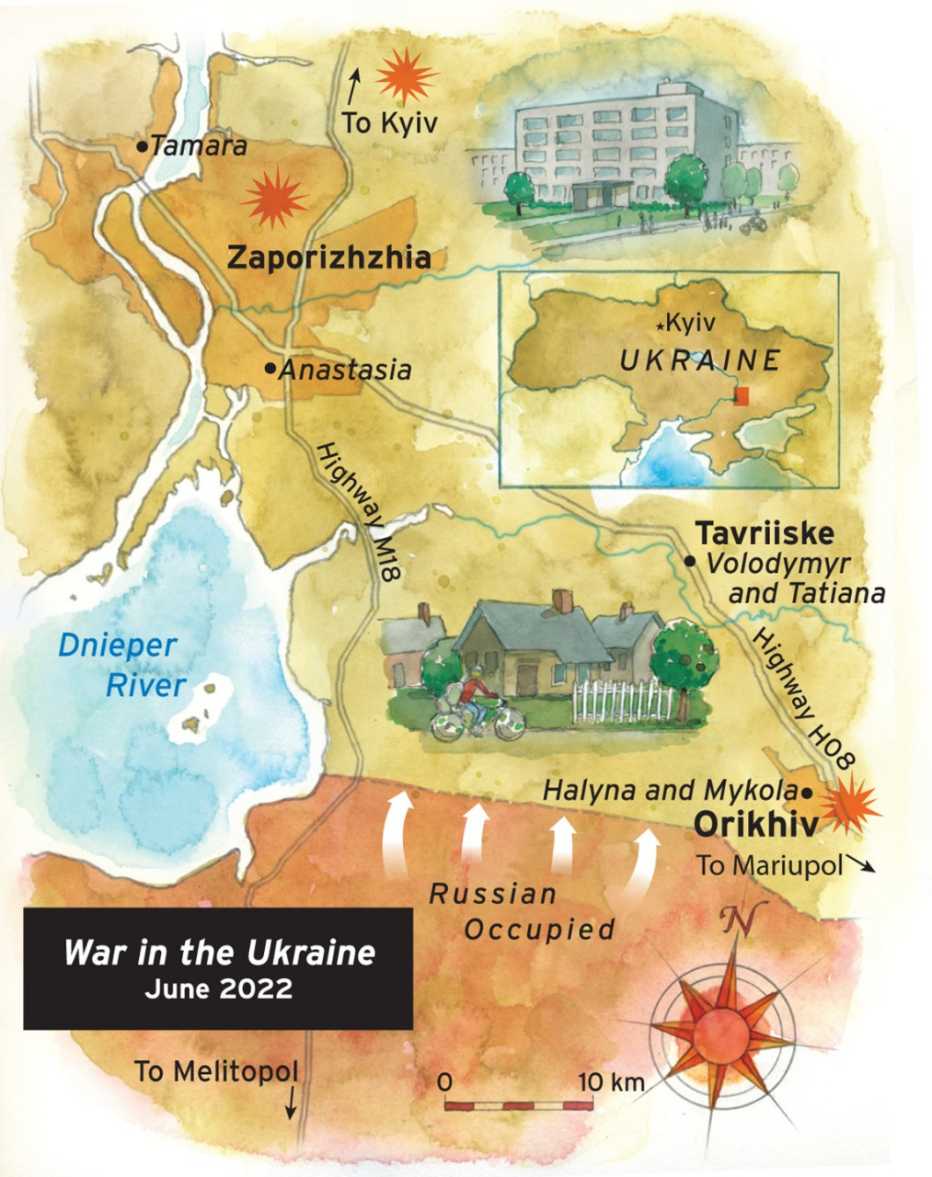AARP Hearing Center
Older Ukrainians — isolated, often poor, in bad health and emotionally tied to their family homes — suffer in unique, terrible ways. The Lupinos family is no exception. The youngest are now refugees, and the elders are rooted to their crumbling house on the front line of the war. Their daughter, Tamara, is desperately trying to unite them all. This is their story.
For Part 2, see: Orphaned Ukraine Elder’s Exodus to Nowhere


Tamara's Choice
TAMARA LUPINOS, a biologist by profession, lives alone in a one-room apartment in an industrial city in southern Ukraine. Tamara, 64, is also a devoted mother, grandmother and daughter who declined better-paying jobs elsewhere to live in Zaporizhzhia, a sprawling city full of Soviet-era buildings perched on the banks of the Dnieper River.
“Here, I’m close to work,” she tells me when we meet near her apartment, “and just an hour’s drive from my parents.”
Before Feb. 24, Tamara’s life had been orderly, if difficult. Work had been stressful recently at the botanical-research institute where she leads the marketing department; there had been COVID absences as well as a lack of funding. In late February, Tamara, an attractive, well-groomed woman with glittery sneakers and a warm, lively manner, was herself still recovering from a long, difficult bout of COVID and a back injury that made it harder than ever to climb the stairs to her ninth-floor apartment.
Still, each day started joyfully, with a check-in call to her parents in the nearby town of Orikhiv. Usually it was her mother, Halyna, 87, who picked up the phone to share her news — as well as updates on Tamara’s father, Mykola, 92, who had survived cancer and two strokes. For Tamara, this was the first of several calls she would make to them each day before they all went to sleep. There were calls to her daughter, Anastasia, 28, too. Tamara is not only the sole caregiver for her aging parents but also a doting grandmother and a continuing source of emotional support for her daughter, who was then raising her own daughter, 4-year-old Kira, with husband Dmytro, 36, in an apartment on the southern fringes of the city.


At 6 a.m. on Feb. 24, everything changed. Tamara’s phone rang. Her daughter, in a panic, blurted out: “Mom, the war’s started. They’re already here. Melitopol is on fire. We’re coming to you.”


Tamara was stunned. War? She had paid scant attention to the reports of Russian troops massing on Ukraine’s borders or to warnings from the United States that a full-scale invasion was imminent. She wasn’t alone. Ukrainian authorities had made few preparations for defense or evacuation, certain that Russia would not venture beyond eastern Ukraine, where a deadly conflict had been simmering for eight years.
But now missiles were falling all over Ukraine. Russia had launched air and ground attacks from the north, south and east, killing civilians and destroying infrastructure. By a terrible twist of fate, four generations of the Lupinos family were caught in the middle of this onslaught. Anastasia lived across the river from her mom, near the road to Melitopol, some 70 miles south, where there were Russian tanks in the streets. And Tamara’s parents lived in Orikhiv, a small town on the road to Mariupol, where the world would watch unspeakable devastation unfold in the weeks ahead.
Anastasia and her family arrived at Tamara’s tiny one-room flat just hours after the Russian invasion began. The elevator was out of order, as usual, so the young couple trudged up the stairs, hauling cases of bottled water. Tamara tried to soothe Kira and answer her questions — but nobody had any answers. That night “the children,” as Tamara calls her daughter’s family, took turns on guard duty so they could alert the others in case of shelling. When the air-raid sirens wailed their warnings, Tamara could not make it down nine floors and to the basement of the school opposite her building. Instead, she spent the first of many long nights of the war sheltering in the bathroom.


The early nightmare days of the invasion unspooled with terrifying speed. By March 1, Russian forces had surrounded Mariupol and were 25 miles from the Lupinos family home in Orikhiv. Cut off from food and medical supplies, Orikhiv, it seemed, would be the next town to fall.
Instead, it held out, and Ukrainian forces dug in, forming a front line just south of town, across agricultural land dotted with historic villages. Then the bombardment commenced. Over the next weeks, those who could get away — largely younger people with children — fled on dangerous Highway H08, north to Zaporizhzhia. Most of the older residents, Halyna and Mykola Lupinos among them, stayed behind.
In a war that forces brutal choices, Tamara Lupinos was caught between saving her parents or her “children.” Her parents, in fragile health, needed her more — but it was now increasingly perilous to get to them. And where would they all go? Her daughter’s family was already staying in her ninth-floor apartment in a city that was being hit sporadically by missiles. “It was constant stress — sirens, sleeping in our clothes,” Tamara recalls. “And I was with my granddaughter all the time: ‘La-la-la, time to get up and run to the bomb shelter.…’ ”
Meanwhile, she called her parents every morning. “I asked them so many times to leave.” Still, she knew they wouldn’t; they were tied to their home. Tamara’s brother is buried in Orikhiv. Her father, infirm, couldn’t travel. Safety and comfort elsewhere seemed questionable at best. “My mother tells me, ‘I understand how much you worry, but there he’ll be stuck in one room, and here he can go out and breathe the fresh air, trees, flowers.’ ”
It’s clearly a conversation Tamara has had with her mother, and with herself, many times. “What can be done?” she repeats. “What?”
For two months after the front line reached Orikhiv, Highway H08 — the road between Tamara and her parents — was impassable. It ran through deadly crossfire as Russian forces attempted to cut off the Ukrainian army and advance on Zaporizhzhia. Tamara could not risk visiting her parents or organize a car to bring them to her.
They still spoke several times daily, if the phone connection worked. Relatives and neighbors who had remained in Orikhiv kept an eye on the older couple, as did social service workers and volunteers. But for Tamara, this was excruciating. “Day and night, I feared for my parents,” she says. “I still wake up in the morning sometimes and think, No, it’s a terrible dream.”
Halyna continued to play down her own difficulties, worrying more about the rest of the family, including Tamara’s aunt, proud and staunchly pro-Ukrainian, who lived in the nearby city of Kherson, which was now occupied by Russian forces. Every morning when Tamara called, before she could even speak, her mother would ask three questions: How are you? How are the children? What about Kherson? “Only afterward would she speak about herself,” says Tamara.
In April, Tamara’s daughter, son-in-law and granddaughter left for western Ukraine, the safest area of the country. They had tried to get Tamara to go with them. She refused; it was too far from her parents.













































































